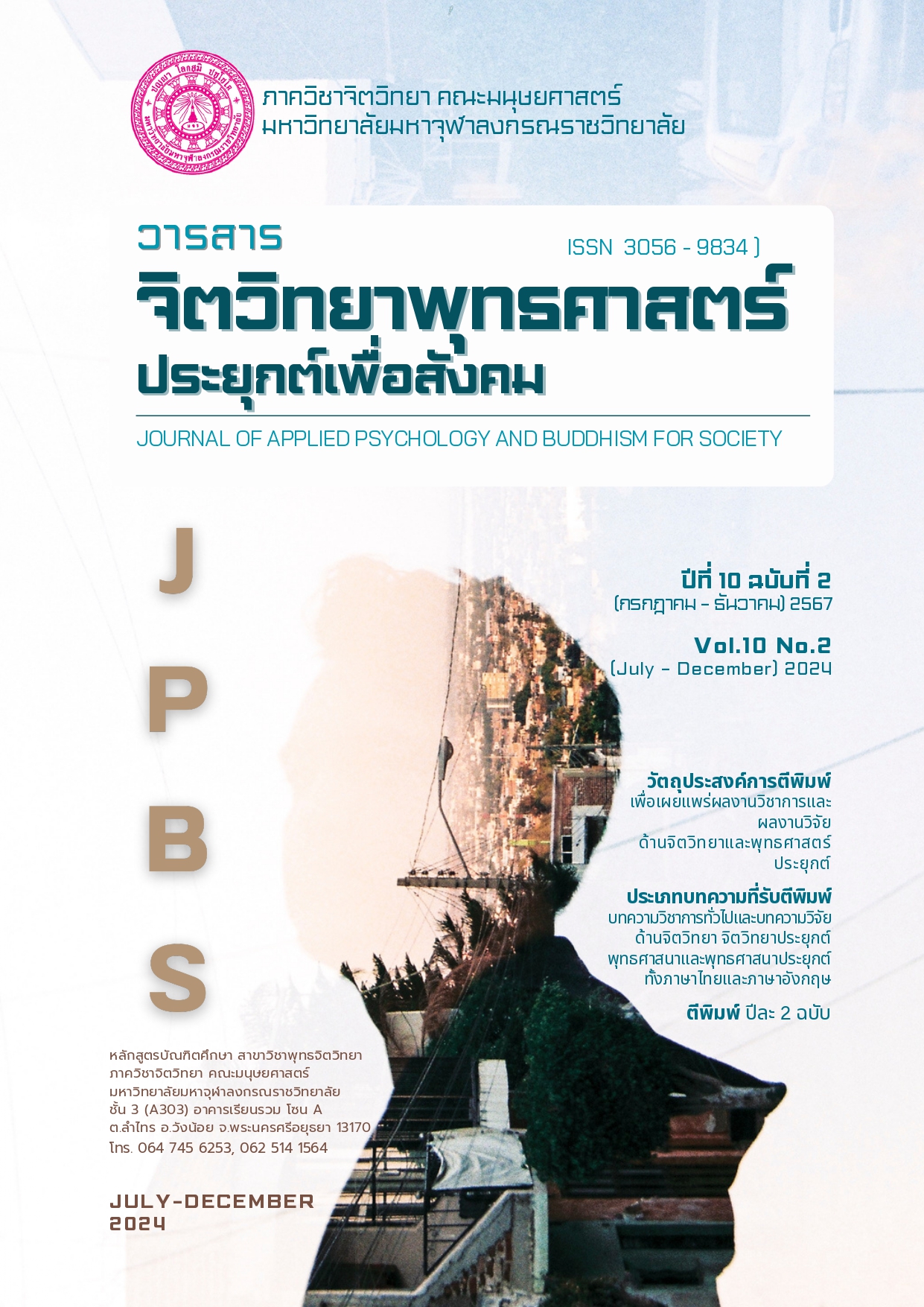The Results of Developing Responsibility for Students' Learning Mathayom 4 at a School with Group Counseling Based on Behaviorist Theory
Keywords:
Group Counseling, Behaviorist Theory, Responsibility for LearningAbstract
This quasi-experimental research aimed to: 1. compare students' learning responsibility before and after participating in group counseling based on behaviorism theory, and 2. compare the learning responsibility of students in the experimental group, who received group counseling, with the control group, who received the school's standard student care system. The population consisted of 148 Grade 10 students at Wat Suthiwararam School. Sixteen students were selected as the experimental group, identified through a learning responsibility behavior assessment and scoring below the 25th percentile. Simple random sampling was used to assign participants to experimental and control groups. The experimental group received group counseling based on behaviorism theory, while the control group received standard student care as per the school's system. Research instruments included a learning responsibility behavior assessment with a content validity index (CVI) of 0.67–1.00 and reliability of 0.96, and group counseling activities based on behaviorism theory with a CVI of 0.67–1.00. Data were analyzed using descriptive statistics and comparative statistics, including the Wilcoxon Signed Rank Test and Mann-Whitney U Test.
The findings revealed that: 1. The learning responsibility of students in the experimental group significantly improved after participating in group counseling based on behaviorism theory at a .05 significance level. Improvements were observed across dimensions, including commitment and perseverance, punctuality, adherence to rules and regulations, and accountability for one’s actions, all showing significant differences at the .05 level. 2. The experimental group demonstrated significantly higher learning responsibility, particularly in commitment and perseverance, compared to the control group at a .05 significance level. Group counseling based on behaviorism theory facilitated self-responsibility development through techniques such as confrontation, changing perspectives, attitudes, and problem-solving within group interactions. These activities fostered behavioral and expressive improvements. Considering each dimension, significant differences were found in commitment and perseverance, punctuality, and accountability at the .001 level, and in adherence to rules and regulations at the .01 level. This study highlights the effectiveness of group counseling based on behaviorism theory in enhancing learning responsibility among students.
References
จิรัฐา โนยราษฎร์. (2563). การเสริมสร้างความรับผิดชอบต่อการเรียนของนักเรียนระดับมัธยมศึกษาตอนต้นโดยใช้กิจกรรมแนะแนว (วิทยานิพนธ์ปริญญามหาบัณฑิต). มหาวิทยาลัยศรีนครินทรวิโรฒ. กรุงเทพฯ.
ชัยธวัช อุตเสน. (2551). การเปรียบเทียบผลการให้คำปรึกษาแบบกลุ่มที่มีต่อความรับผิดชอบทางการเรียนของนักเรียนช่วงชั้นที่ 3 ระหว่างทฤษฎียึดบุคคลเป็นศูนย์กลางและทฤษฎีพฤติกรรมนิยม (การศึกษามหาบัณฑิต จิตวิทยาการให้คำปรึกษา). มหาวิทยาลัยมหาสารคาม. มหาสารคาม.
นพพร แสงทอง. (2563). การเสริมสร้างสมรรถนะการให้คำปรึกษาของนักเรียนเพื่อนที่ปรึกษาโดยการฝึกอบรมเชิงจิตวิทยา (วิทยานิพนธ์ปริญญามหาบัณฑิต). มหาวิทยาลัยศรีนครินทรวิโรฒ. กรุงเทพฯ.
บุญชม ศรีสะอาด. (2558). การวิจัยเบื้องต้น (พิมพ์ครั้งที่ 9). กรุงเทพฯ: สุริยาสาส์น.
เบญญาภา หลวงราช. (2560) .ปัจจัยที่ส่งผลต่อความมีวินัยในตนเองของนักเรียน โรงเรียนขยายโอกาสทางการศึกษา จังหวัดพระนครศรีอยุธยา (วิทยานิพนธ์ปริญญามหาบัณฑิต). มหาวิทยาลัยศิลปกร. กรุงเทพฯ.
ประกิต วิทยสัมพันธ์. (2560). รูปแบบการพัฒนาจริยธรรมด้านการมีวินัยของนักเรียน โรงเรียนมัธยมศึกษาในจังหวัดพระนครศรีอยุธยา. วารสารช่อพะยอม, 29(1), 225-235.
พนม เกตุมาน. (2560). ปัญหาพฤติกรรมวัยรุ่น. กรุงเทพฯ : ประยูรสาส์นไทยการพิมพ์.
พสุ วุฒินันท์ และ นาฏนภางค์ โพธิ์ไพจิตร. (2563). แนวทางการให้คำปรึกษาตามทฤษฎีพฤติกรรมนิยม Counseling approach based on behavioral theory. วารสารพุทธจิตวิทยา, 6(1), 1-18.
พระครูนิวิฐธุราทร.(2560). พรหมวิหารธรรม. สืบค้น 12 มีนาคม 2567, จาก https://www.gotoknow.org/posts/252165
พงษ์พันธ์ พงษ์โสภา และ วิไลลักษณ์ พงษ์โสภา. (2556). ทฤษฎีและเทคนิคการให้บริการปรึกษา. กรุงเทพฯ : สำนักพิมพ์แห่งจุฬาลงกรณ์มหาวิทยาลัย.
ภรณ์ทิพย์ ศิริกุลวิเชฐ. (2562). ผลการให้การปรึกษาแบบกลุ่มตามทฤฎีการเรียนรู้ทางปัญญาสังคมต่อการมีวินัยในตนเองของนักเรียนมัธยมศึกษาปีที่ 1 โรงเรียนลำปลายมาศ จังหวัดบุรีรัมย์. วารสารวิจัยและพัฒนามหาวิทยาลัยราชภภัฎบุรีรัมย์, 14(1), 76-90.
ยุภาวดี ชำนาญเวช. (2565). ปัจจัยที่ส่งผลกระทบต่อพฤติกรรมของการขาดความรับผิดชอบของนักเรียนในชุมชนชนบท. วารสารสมาคมพัฒนาวิชาชีพการบริหารการศึกษาแห่งประเทไทย, 4(1), 45-54.
วรรณา เสนีย์วงศ์, ทรงวุฒิ อยู่เอียม และ เพ็ญนภา กุลนภาดล. (2562). ผลการปรึกษากลุ่มทฤษฎีพฤติกรรมนิยมต่อความมีวินัยในตนเอง ของนักเรียนระดับประถมศึกษาตอนปลาย (วิทยานิพนธ์ปริญญามหาบบัณฑิต). มหาวิทยาลัยบูรพา. ชลบุรี.
สุวมาศ ไชยบูรณ์. (2561). การเปรียบเทียบผลการให้การปรึกษาแบบกลุ่มตามทฤษฎีพฤติกรรมนิยมและทฤษฎีพิจารณาเหตุผล อารมณ์ และพฤติกรรมเพื่อลดพฤติกรรมไม่เหมาะสมในการเรียนของนักเรียนกลุ่มเสี่ยง (วิทยานิพนธ์การศึกษามหาบัณฑิต สาขาวิชาจิตวิทยาการศึกษาและการแนะแนว). มหาวิทยาลัยมหาสารคาม. มหาสารคาม.
สำนักงานเลขาธิการสภาการศึกษา. (2561). การวิจัยและพัฒนารูปแบบกลไกการเสริมสร้างวินัยในสถานศึกษาระดับการศึกษาขั้นพื้นฐานด้านความรับผิดชอบและการตรงต่อเวลา. กรุงเทพฯ : สำนักงานเลขาธิการสภาการศึกษา.
Adlya.S.I. (2020). The contribution of self control to students’ discipline. Universitas Negeri Padang.
Blumberg P., and McCann A. (2009). Developing Learner-Centered Teaching: A Practical Guide for Faculty. Journal of Dental Education, 73, 1125-1126.
Carpenter, J., and Pease, J. (2013). Preparing Students to Take Responsibility for Learning: The Role of Non-Curricular Learning Strategies. Journal of Curriculum and Instruction, 7, 38-55.
Eisler, R. (2000). Tomorrow’s children. USA: Westview Press.
Fritz, J. (2017). Using Analytics to Nudge Student Responsibility for Learning. New Directions for Higher Education, 2017(179), 65-75.
Jacobs, E., Masson, L., & Harvill, L. (2002). Group counseling: strategies and skills (3rd). CA: Brooks/Cole.
Ohlsen, M. M. (1970). Group counseling. New York: Rinehart and Winston, Inc.
Downloads
Published
How to Cite
Issue
Section
Categories
License
Copyright (c) 2024 Journal of Applied Psychology and Buddhism for Society

This work is licensed under a Creative Commons Attribution-NonCommercial-NoDerivatives 4.0 International License.






